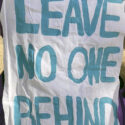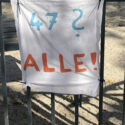Tag: Greek islands
-

Urgent Call from Moria Camp for Help in Corona Times
Update 2/9/2020: This call was the second open letter to the EU and its member states to evict the Moria camp on the greek island of Lesvos in face of the pandemic threat. The inhabitants of the overcrowded camp have not received any answer so far, while everyone on the spot, including the support initiatives…
-

Ce qui se passe dans les camps en Grèce est une tragédie
de Ben / di Ben Italiano vedi sotto Il n’y a pas des mots pour décrire la souffrance des gens. Des femmes enceintes, des enfants petits, des malades se trouvent sans soutien dans des camps. Les conditions de vie ne sont pas imaginable. L’hygiène est impossible – comment respecter s’il n’y a ni du savon,…